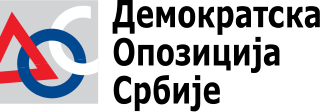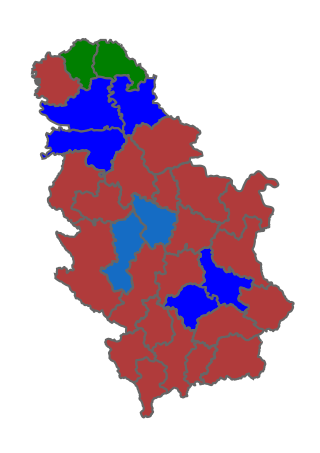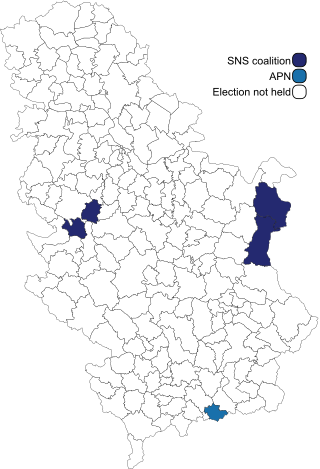
The Socialist Party of Serbia is a political party in Serbia. Ivica Dačić has led SPS as its president since 2006.

The Democratic Opposition of Serbia was a wide electoral alliance of political parties in Serbia, intent on ousting the ruling Socialist Party of Serbia and its leader, Slobodan Milošević.

The Democratic Party is a social democratic political party in Serbia. Zoran Lutovac has led the party as its president since 2018. The party is colloquially known as the žuti (yellows) because of one of its main colours.

The Liberals of Serbia was a political party in Serbia.

The Serbian Renewal Movement is a liberal and monarchist political party in Serbia. Since its formation in 1990, it has been led by writer Vuk Drašković.

The Alliance of Vojvodina Hungarians is a regionalist political party in Serbia, representing the Hungarian minority in Vojvodina.
The Liberal Democratic Party, known as the Liberal Party until 1997, was a political party in Serbia. Founded in 1989, its first president was Aleksandar Stefanović. Stefanović left LS to join Vojislav Šešelj's Serbian Chetnik Movement in June 1990. He was then succeeded Predrag Vuletić, who ran as a perennial candidate in elections up till 1997.

The Liberal Democratic Party is a liberal political party in Serbia. It is led by Čedomir Jovanović.
A constitutional referendum was held in Serbia on 28 and 29 October 2006, in which voters decided on adopting a new Constitution. The constitution is Serbia's first as an independent state since the Kingdom of Serbia's 1903 constitution. Over 6.6 million people were entitled to vote in the national referendum.

The Democratic Fellowship of Vojvodina Hungarians is a political party in Serbia, representing the Hungarian minority in Vojvodina.

The Party of United Pensioners, Farmers, and Proletarians of Serbia – Solidarity and Justice is a political party in Serbia that advocates for pensioners' interests.
The Social Democratic Party of Serbia is a centre-left political party in Serbia. Orientated towards the principles of social democracy, it has been led by Rasim Ljajić since its formation in 2009.

The Serbian Progressive Party has been the ruling political party of Serbia since 2012. Miloš Vučević has served as its president since 2023.

General elections were held in the Yugoslav province of Serbia on 21 September 1997, to elect the president and members of the National Assembly. With no presidential candidate receiving over 50% of the vote in the first round, a second round was held on 5 October. Running on a platform of nationalism and neoliberal economic reforms, Vojislav Šešelj of the Serbian Radical Party received the most votes in the runoff. However, voter turnout was only 49%, below the required 50%. As a result, the elections were annulled, and fresh elections were scheduled for December.

Parliamentary elections were held in Serbia on 17 December 2023 to elect members of the National Assembly. While they were initially scheduled to be held by 30 April 2026, Aleksandar Vučić, the president of Serbia, called a snap election in November 2023, after previously announcing that snap elections could be either held in 2023 or 2024. In addition to the parliamentary elections, the Vojvodina provincial and local elections were held in 65 cities and municipalities, including the capital, Belgrade.

General elections were held in Serbia on 3 April 2022 to elect both the president of Serbia and members of the National Assembly. Initially, parliamentary elections were scheduled to be held in 2024; however, in October 2020 president Aleksandar Vučić said that snap parliamentary elections would be held in or before April 2022. In addition to the general elections, local elections were held simultaneously in 12 municipalities and 2 cities, including Belgrade, the capital of Serbia.

Local elections in Serbia were held on 28 March 2021 in the municipalities of Zaječar, Kosjerić and Preševo, and on 17 October in Mionica and Negotin.
Local elections were held in Serbia on 19 September and 3 October 2004, concurrently with the 2004 Vojvodina provincial election. This was the only local election cycle held while Serbia was a member of the State Union of Serbia and Montenegro.
A small number of municipalities in Serbia held local elections in 2006 for mayors, assembly members, or both. These were not part of the country's regular cycle of local elections but instead took place in certain jurisdictions where either the local government had fallen or the term of the municipal assembly had expired.

Local elections in Serbia were held on 3 April 2022 in the municipalities of Aranđelovac, Bajina Bašta, Belgrade, Bor, Doljevac, Kladovo, Knjaževac, Kula, Lučani, Majdanpek, Medveđa, Sečanj, Sevojno, and Smederevska Palanka. Alongside the local elections, national-level general elections were held simultaneously on the same day.
















